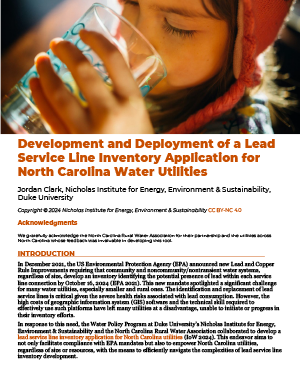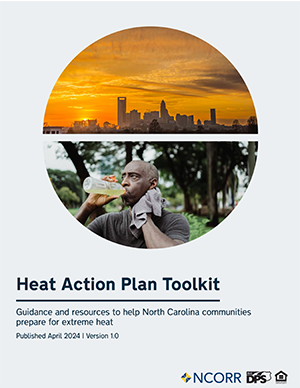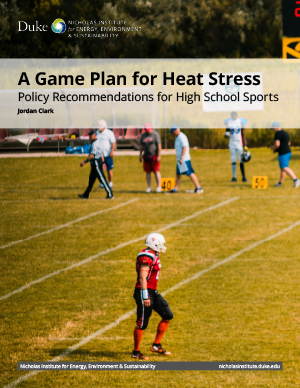Publications
Development and Deployment of a Lead Service Line Inventory Application for North Carolina Water Utilities
This white paper presents an application designed to help North Carolina water utilities complete federally required lead service line inventories. Using available datasets, the application simplifies the inventory process, reduces software barriers, details development and utility engagements, and proposes enhancements for broader use. The paper highlights methods and future improvements, aiming to extend the tool's reach to help utilities nationwide manage lead contamination efficiently.
North Carolina Heat Action Plan Toolkit
With climate change driving more frequent and intense heat events, North Carolina's Heat Action Plan Toolkit aims to help communities adapt and build resilience to extreme heat. Primarily targeted for use by local governments, including health and emergency management departments, the toolkit focuses on approaches to reduce the human health impacts of increasing temperatures and heat waves.
A Game Plan for Heat Stress: Policy Recommendations for High School Sports
High school athletic associations (HSAAs) bear the responsibility of ensuring the health and safety of student-athletes. Exertional heat illness poses a significant risk, making this a task of increasing urgency in light of climate change and rising temperatures. This policy brief builds on prior research to offer recommendations to HSAAs as part of an ongoing commitment to safeguard student-athletes from heat-related illnesses.
Defining Extreme Heat as a Hazard: A Review of Current State Hazard Mitigation Plans
US states must have a FEMA-approved state hazard mitigation plan (SHMP) to apply for certain nonemergency disaster funds and funding for mitigation projects. SHMPs indentify the hazards that may impact a state and detail corresponding mitigation strategies. This report assesses the treatment and definition of heat as a hazard in each state's most recent plan. The importance of extreme heat—the leading cause of weather-related death in the United States—is often understated because it does not fit easily into current SHMP guidelines. The authors provide recommendations to help states adequately evaluate the threat of extreme heat as they update their SHMPs.
The Impact of Heat Exposure on Reduced Gestational Age in Pregnant Women in North Carolina, 2011–2015
Heat stress poses serious health risks to maternal health, including an increased probability of preterm labor and preterm birth. Yet the Southeastern US, where extreme heat exposure is high and maternal outcomes are some of the most challenging in the nation, has seen insufficient research and action on this issue. This study reveals significant impacts to pregnant women exposed to heat over a 5-year period during North Carolina’s annual warm season (May–September).





